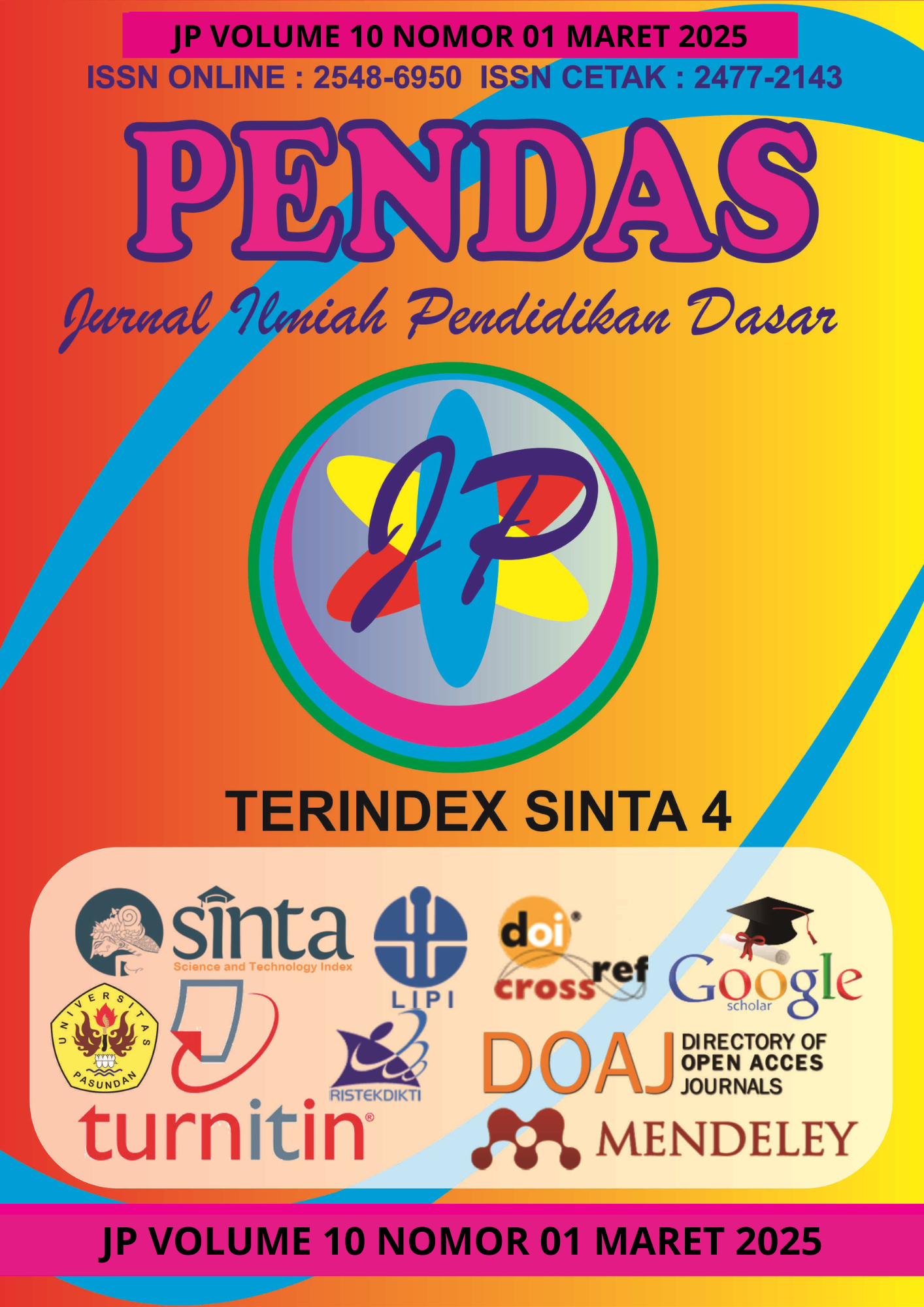PENGARUH PENDEKATAN STEAM BERBASIS PJBL TERHADAP KEMAMPUAN PROBLEM SOLVING PADA MATERI PERMASALAHAN LINGKUNGAN
DOI:
https://doi.org/10.23969/jp.v10i01.22475Keywords:
Steam-PjBL, problem solvingAbstract
This study aims to analyse whether there is an influence of the STEAM approach integrated with Project-Based Learning (PjBL) on students' problem-solving abilities in the context of environmental issues. STEAM-PjBL is a combination of the STEAM approach (Science, Technology, Engineering, Art, Mathematics) with the Project-Based Learning model. This method blends elements of STEAM education with project-based learning to create a learning experience that is contextually rich, collaborative, and relevant to real-world situations. The study employed a quasi-experimental method with a Nonequivalent Control Group Design. The subjects were Year 5 students of SDN Dukuh Menanggal 1/424 in Surabaya, with the experimental class implementing STEAM-PjBL and the control class utilising Problem-Based Learning. Data were collected through pre-tests and post-tests to measure problem-solving indicators, including understanding the problem, developing a plan, and implementing the problem-solving plan. The data were analysed using normality tests, homogeneity tests, and t-tests via SPSS. The findings reveal that the STEAM-PjBL approach has a significant impact on students' problem-solving abilities in the topic of environmental issues.
Downloads
References
Adriyawati, Erry Utomo, Yuli Rahmawati, Dan Alin Mardiah. 2020. “Steam-Project-Based Learning Integration To Improve Elementary School Students’ Scientific Literacy On Alternative Energy Learning.” Universal Journal Of Educational Research 8(5):1863–73. Doi: 10.13189/Ujer.2020.080523.
Cahyani, Gita Putri, Dan Sulastri Sulastri. 2021. “Pengaruh Project Based Learning Dengan Pendekatan STEAM Terhadap Kemampuan Berpikir Kritis Pada Pembelajaran Online Di SMK Negeri 12 Malang.” Jurnal Pendidikan Akuntansi (JPAK) 9(3):372–79. Doi: 10.26740/Jpak.V9n3.P372-379.
Fitria, Neng Fia Nisa, Nurul Hidayani, Heris Hendriana, Dan Risma Amelia. 2018. “Analisis Kemampuan Pemecahan Masalah Matematik Siswa SMP Dengan Materi Segitiga Dan Segiempat.” Edumatica: Jurnal Pendidikan Matematika 08(01):49–57.
Fitriyah, Anis, Dan Shefa Dwijayanti Ramadani. 2021. “Penerapan Metode Project Based Learning.” Journal Of Education 3(1):7. Doi: 10.26737/Jpmi.V1i1.76.
Hadinugrahaningsih, Tritiyatma, Yuli Rahmawati, Achmad Ridwan, Arie Budiningsih, Elma Suryani, Annisa Nurlitiani, Dan Cinthia Fatimah. 2017. “Ketrampilan Abad 21 Dan STEAM (Science, Technology, Engineering, Art, And Mathematics).” Jakarta 1–110.
International Association For The Evaluation Of Educational Achievement. 2021. Findings From The TIMSS 2019 Problem Solving And Inquiry Tasks.
JUWITA, RATNA. 2022. “Best Practice Membangun Keterampilan Proses Sains Melalui Model Project Based Learning Pendekatan Steam Materi Asam Basa Kelas Xi Ipa Sman 1 Bontang.” LEARNING : Jurnal Inovasi Penelitian Pendidikan Dan Pembelajaran 2(3):268–77. Doi: 10.51878/Learning.V2i3.1581.
Prastyo, Danang, Rarasaning Satianingsih, Ida Sulistyowati, Dan Sunu Catur Budiyono. 2022. “PENGARUH MODEL PBL TERHADAP KEMAMPUAN BERFIKIR KRITIS MAHASISWA PGSD UNIPA SURABAYA.” Jurnal Pendidikan Dasar Volume VI,.
Ramadhani, Delia Adinda, Dan Dori Lukman Hakim. 2021. “Kemampuan Problem-Solving Matematis Siswa Sma Dalam Menyelesaikan Permasalahan Materi Fungsi.” Jurnal Pembelajaran Matematika Inovatif 4(5):1113–22. Doi: 10.22460/Jpmi.V4i5.1113-1122.
Tambunan, Hardi. 2020. “Kemampuan Siswa Dalam Pemecahan Masalah Matematika Dengan Strategi Heuristik.” Sepren 1(02):28–33. Doi: 10.36655/Sepren.V1i02.209.
Yuriev, Elizabeth, Som Naidu, Luke S. Schembri, Dan Jennifer L. Short. 2017. “Scaffolding The Development Of Problem-Solving Skills In Chemistry: Guiding Novice Students Out Of Dead Ends And False Starts.” Chemistry Education Research And Practice 18(3):486–504. Doi: 10.1039/C7rp00009j.
Downloads
Published
Issue
Section
License
Copyright (c) 2025 Pendas : Jurnal Ilmiah Pendidikan Dasar

This work is licensed under a Creative Commons Attribution 4.0 International License.














































